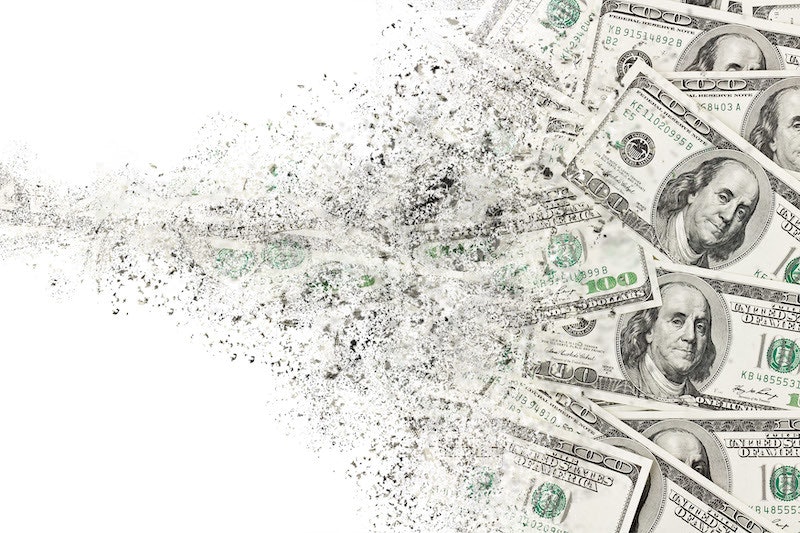Saving money feels good under any circumstances. But when your finances are stretched or uncertain, finding fresh ways to cut back can be life-changing.
“You’ll get the biggest bang for your buck if you target areas where you didn’t realize you were overspending or losing money anyway,” says Brian O’Connor, author of “The $1,000 Challenge.” Here are seven places money may be leaking out of your budget without you realizing it — and how to stop it.
Money Leak: Food Waste
Americans waste nearly a pound of food per person each day, and by some estimates a family of four can lose $1,500 a year, or more.
To get every dollar out of your grocery budget, organize your weekly meals so your family is eating the most perishable items first (say, berries, leafy greens, and raw fish) and plan meals featuring heartier items, like potatoes, carrots and beans for later, says Wendy Bazilian, PhD, RD. If your family isn’t a big fan of leftovers, get creative with repurposing them, using grilled chicken for sandwiches one night, tacos another, or transforming leftover roasted veggies into an easy frittata. If you’re looking for more inspiration, the Environmental Protection Agency and the National Resource Defense Fund both offer meal planning advice and other food-saving resources.
Money Leak: Late Fees
Making a late credit card payment can set you back up to $35. A late mortgage payment can add hundreds of dollars to your bill. A late fee for a car loan can also add up. If you’ve made late payments in the past because the date slipped your mind, try enrolling in auto-pay. But if you’re not able to pay on time because you don’t have the funds, reach out to the lender. Many lenders are temporarily waiving late fees because of the global pandemic. And credit card companies may be able to work with you to lower your minimum payment, so you’re able to make on-time payments and chip away at the balance owed.
Money Leak: Ghost Subscriptions
Don’t worry, we’re not going to suggest that you ditch your streaming TV if that’s helping you make it through the pandemic. (Though rotating your subscriptions may be a way to get your TV fix for less. Watched everything you love on HBO? Hit pause and turn your attention to Showtime.) But beyond TV, we’re guessing there are a few subscriptions you can nix without pain. Grab your bank and credit card statements and review all of the recurring charges that are hitting your account each month, suggests Katie Waters, CFP, founder of Stable Waters Financial. Most people have subscriptions that they’ve long forgotten about (say, that deluxe crossword app you downloaded or the yoga trial you meant to quit). Canceling those dusty subscriptions puts more money back in your pocket. If you need to tighten your belt further, target subscriptions that you still use, but less often: say, your gym membership or the podcast you used to listen to on your commute.
Money Leak: Media Binge Buying
Library branches across the country are closed due to COVID-19, so many people are relying on online retailers to satisfy their reading and viewing habits. But if you’re keen to borrow, not buy, it’s worth knowing that many libraries are still offering a wide variety of content, from e-books to audiobooks to videos, online. Visit your local library’s website for details on how to access their digital offerings — free of charge.
Money Leak: Forgotten FSA Dollars
If you have a flexible spending account (FSA) through your employer’s health insurance, make sure you’re using those funds to cover health care expenses. If not, you might lose them at the end of the plan’s year. (You can check with your benefits coordinator, if you’re unsure of when your FSA funds will expire.) Typical FSAs can be used for a wide variety of health care needs, from the copay on your doctor’s appointment and prescription medication to over-the-counter drugs like ibuprofen. This money is pre-tax, so it will go further than your average dollar, and if your employer makes contributions, that’s an extra advantage.
Money Leak: Insurance You Don’t Use
“If you are not driving your car right now you may not need full coverage,” says Elaine King, a certified financial planner and founder of Family and Money Matters. Check to see if your insurance company offers a pay-per-mile insurance option, which may help you save if your car is spending the pandemic in the garage. Many auto insurers are also offering partial refunds on insurance premiums, because people are driving less during the pandemic.
Money Leak: Expiring Rewards
It’s common to sign up for cash back rewards on your credit card and then let them sit — but now is the time to tap into them, King says. Redeem any rewards that have been piling up in your account, which could help you pay down your credit card debt or give your grocery budget a cushion. If you have a card that allows you to choose your reward categories, now might also be a good time to reassess your spending habits. If the pandemic has shifted your spending (less filling up at the gas station, more...puzzles?), think about temporarily shifting which categories give you greater rewards.
Note to our readers: This information is being made available as a free resource to the public. It is not an endorsement of any of the Finance-Related Resources listed in this article — financial consultants, planners, services, organizations/associations, websites, tools, lenders, credit unions, or banks. None of the Finance-Related Resources listed have solicited Rally Health to be included, and Rally Health receives no compensation from the Finance-Related Resources mentioned in this article.
KATE ROCKWOOD
Rally Health





